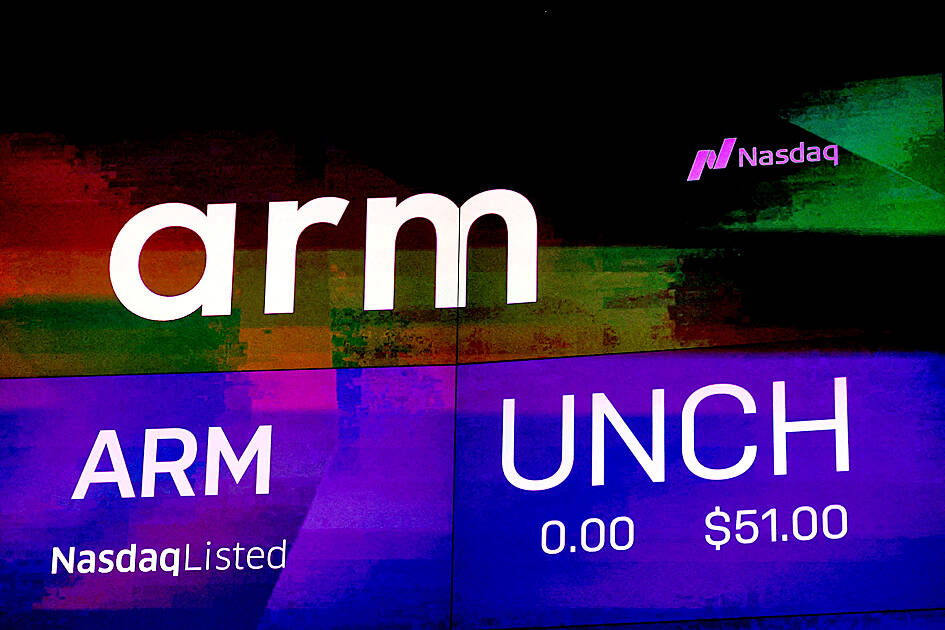Arm Holdings PLC’s Chinese venture is appointing a local chip veteran to be its new chief executive officer, seeking to consolidate leadership to better navigate fast-paced geopolitical and technological shifts.
Arm China plans to tap Chen Feng (陳鋒), a former executive at Fuzhou, Fujian Province-based chipmaker Rockchip Electronics Co (瑞芯微電子), according to people familiar with the matter. The appointment will be made after this week’s Lunar New Year holiday, they said.
Liu Renchen (劉仁辰) and Eric Chen (陳恂) will resign their posts as co-CEOs, the people said. Fang Fenglei (方風雷), founder of joint venture partner Hopu Investment Management Co (厚樸投資管理), is Arm China’s chairman, one of the people said.

Photo: Reuters
Chen Feng’s appointment closes the chapter to a tumultuous period for Arm’s China outpost. The new CEO will be in charge of helping the Cambridge, UK-based company adapt to a changing landscape as the prospect of cheaper artificial intelligence (AI) creates new tech winners and losers: Chinese start-up DeepSeek’s (深度求索) arrival as a serious contender to OpenAI and Meta Platforms Inc sparked a US$1 trillion rout on Monday. That threatens to upend assumptions in the lucrative datacenter market that the semiconductor designer is now targeting.
The two co-CEOs have served as interim leaders of Arm China since the 2022 ouster of former CEO Allen Wu (吳雄昂), who was fired in 2020 for alleged conflicts of interest but refused to leave.
A leadership vacuum emerged, with the co-CEOs juggling commitments elsewhere, according to people familiar with Arm China’s operations. Liu is affiliated with the Research Institute of Tsinghua University in Shenzhen, while Eric Chen, who joined the board while a managing partner at the Softbank Vision Fund, is co-founder of ParityBit Technologies, one of the people said.
Given the limitations on the two co-CEOs’ time, the board appointed Chen Feng to be sole, full-time CEO to help the joint venture better navigate the fast-paced technological and geopolitical shifts of the industry, two of the people said.
Arm — whose chip designs are used in most of the world’s smartphones including Apple Inc’s iPhone — is on the front lines of a US-China technological rivalry that has resulted in US-led export curbs on the most advanced AI chips. Arm and other US businesses operating in China are grappling with growing tensions as Beijing warily eyes US President Donald Trump’s “America First” policies and his threats of more tariffs.
Majority-owned by Japan’s Softbank Group Corp, Arm sells chip designs and licenses code that helps software communicate with processors.

SELL-OFF: Investors expect tariff-driven volatility as the local boarse reopens today, while analysts say government support and solid fundamentals would steady sentiment Local investors are bracing for a sharp market downturn today as the nation’s financial markets resume trading following a two-day closure for national holidays before the weekend, with sentiment rattled by US President Donald Trump’s sweeping tariff announcement. Trump’s unveiling of new “reciprocal tariffs” on Wednesday triggered a sell-off in global markets, with the FTSE Taiwan Index Futures — a benchmark for Taiwanese equities traded in Singapore — tumbling 9.2 percent over the past two sessions. Meanwhile, the American depositary receipts (ADRs) of Taiwan Semiconductor Manufacturing Co (TSMC, 台積電), the most heavily weighted stock on the TAIEX, plunged 13.8 percent in

A wave of stop-loss selling and panic selling hit Taiwan's stock market at its opening today, with the weighted index plunging 2,086 points — a drop of more than 9.7 percent — marking the largest intraday point and percentage loss on record. The index bottomed out at 19,212.02, while futures were locked limit-down, with more than 1,000 stocks hitting their daily drop limit. Three heavyweight stocks — Taiwan Semiconductor Manufacturing Co (TSMC, 台積電), Hon Hai Precision Industry Co (Foxconn, 鴻海精密) and MediaTek (聯發科) — hit their limit-down prices as soon as the market opened, falling to NT$848 (US$25.54), NT$138.5 and NT$1,295 respectively. TSMC's

TARIFFS: The global ‘panic atmosphere remains strong,’ and foreign investors have continued to sell their holdings since the start of the year, the Ministry of Finance said The government yesterday authorized the activation of its NT$500 billion (US$15.15 billion) National Stabilization Fund (NSF) to prop up the local stock market after two days of sharp falls in reaction to US President Donald Trump’s new import tariffs. The Ministry of Finance said in a statement after the market close that the steering committee of the fund had been given the go-ahead to intervene in the market to bolster Taiwanese shares in a time of crisis. The fund has been authorized to use its assets “to carry out market stabilization tasks as appropriate to maintain the stability of Taiwan’s

In a small town in Paraguay, a showdown is brewing between traditional producers of yerba mate, a bitter herbal tea popular across South America, and miners of a shinier treasure: gold. A rush for the precious metal is pitting mate growers and indigenous groups against the expanding operations of small-scale miners who, until recently, were their neighbors, not nemeses. “They [the miners] have destroyed everything... The canals, springs, swamps,” said Vidal Britez, president of the Yerba Mate Producers’ Association of the town of Paso Yobai, about 210km east of capital Asuncion. “You can see the pollution from the dead fish.